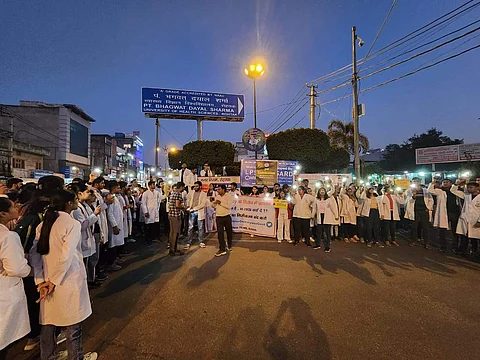

Medical students across Haryana are protesting against the state government's bond policy. The protests, which began at the beginning of November, have intensified so much that concerns from across the country have been pouring in. Serious questions were recently raised on the necessity of a bond policy, leading to the Union Health Ministry considering the possibility of doing away with it altogether. We, at EdexLive, figured that this would be the right opportunity to decode the policy and understand the situation.
What is the bond policy about?
It is a policy applicable to MBBS, MD and MS doctors, by which they are required to serve the state government for a certain period of time. If they deny this service, the doctors have to pay a fixed amount to the state government, as decided by the government. It is also known as a service bond.
Why is it imposed?
There are three reasons why such a policy is imposed by states:
1. Since medical education in government colleges is subsidised, the government wants students from these colleges to provide some service to the government after they complete their degrees, explains Dr Ankit Gulia, President of the Resident Doctors' Association (RDA) at the Pandit Bhagwat Dayal Sharma Post Graduate Institute of Medical Sciences (PGIMS) in Rohtak.
2. Career consultant Jayprakash Gandhi points out that there are many rural areas in a state with primary healthcare centres where doctors are needed. And since some students prefer to move away with their medical degrees, a bond policy is a way to make them stay.
3. The government has to collect funds to build new medical colleges and improve its healthcare infrastructure. "The bond policy is a way of collecting funds," Dr Gulia says.
However, Gandhi explains that the bond policy is neither mandated by the Centre nor does it interfere in the matter. "It is only a few states that have such policies in place," he says.
Why is Haryana's bond policy worrying students?
Here are some of the problems they have pointed out so far:
1. A hefty amount - Dr Gulia said that while the bond policies in other states fixed the bond amount within Rs 10-20 lakh for MBBS students, the Haryana state government pegged it at Rs 40 lakh, to be paid at the time of admission in tranches of Rs 10 lakh in four years of the MBBS course, starting from the first year itself. This has students worried and they say that many are opting out of admission due to this.
2. Banks' intervention - According to the policy, if a student is unable to pay, the government will provide a loan of Rs 10 lakh, which will be waived off if the student procures a government job. But the rate of interest is not specified. "IDBI Bank has been designated to provide loans. We are not sure of the procedure," Dr Gulia said.
3. No job guarantee - The state government does not provide a job guarantee and jobs in Haryana are few, with a large number of applicants. As such, students may stand the risk of having to pay the bond amount.
4. A long duration - The Haryana government has fixed 7 years as the bond period. Students complain that it is too long a time. And there is no clarification if they can pursue higher education in this period.
Did the protests help?
Continuous protests by students have evoked a say from CM Khattar on the matter, who has now stated that the bond amount need not be paid at the time of admission, but can be paid after the course completion, as Dr Gulia informed. However, the students are not satisfied and want the policy rolled back. Meanwhile, the Union Health Ministry is also looking into the matter, as per a report by PTI.
What's the Centre's stand on this?
There is no provision for a bond under the NMC Act, 2019 or in the previous Indian Medical Council (IMC) Act, 1956. In August 2019, the Supreme Court upheld the bond policy of states, observing that certain governments imposed rigid conditions. The apex court further suggested that the then IMC frame a uniform policy concerning compulsory entertainment. Next, the National Medical Commission (NMC) came into being and following the court's guidelines, constituted a committee to review the policy. However, later it was concluded that the policy does not need to be reviewed anew and since then deliberations on a uniform policy continue.
The way ahead?
In the absence of a uniform policy or any rule or regulation regarding it, Jayprakash Gandhi suggests that states should review their policy every two years. "Vacancy at the health centres, emergencies like pandemics and so on should be considered before deciding the amount and period of the policy," he said, and added, "Nonetheless, the policy should not be implemented for first-year students. Students should be mentally prepared for this."
